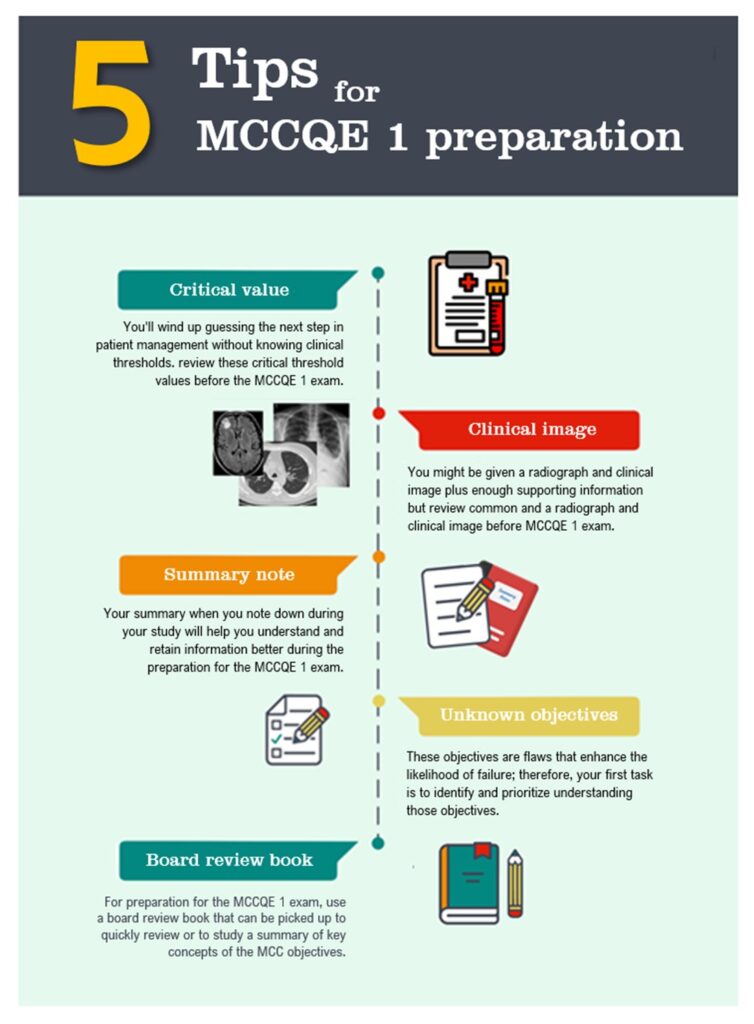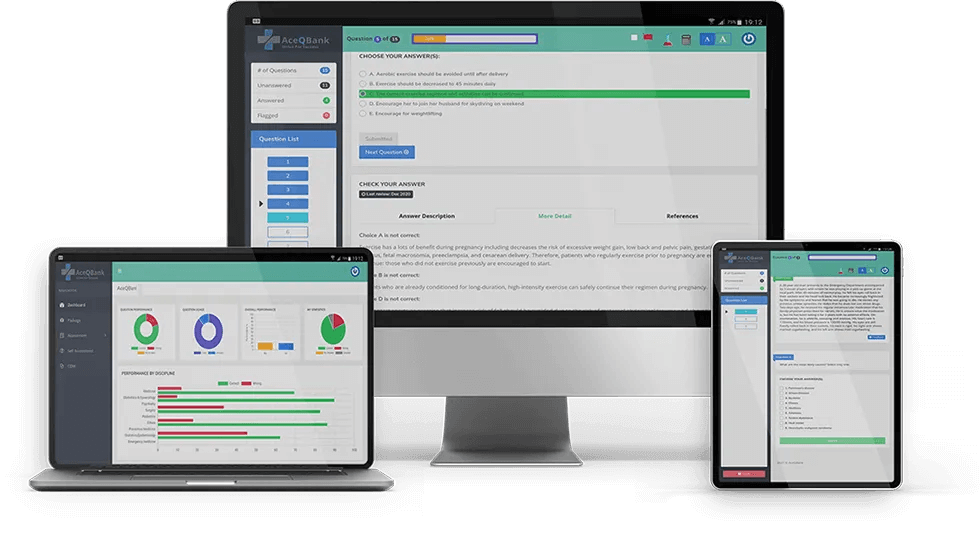MCCQE 1 exam – 5 tips for preparation

The Medical Council of Canada (MCC) is in charge of accrediting Canadian medical students and for the assessment of overseas-trained doctors -International Medical Graduates (IMGs)- applying for registration to practice in Canada. Clinical competence and performance are assessed by testing clinical knowledge and problem-solving abilities in the face of actual clinical presentation.
These assessments are carried out through a computer-based exam known as the Medical Council of Canada Qualifying Examination (MCCQE) Part 1 exam and a clinical examination known as the National Assessment Collaboration (NAC) exam. The goal of the MCCQE 1 exam is to assess clinical competence, which requires the attainment of appropriate medical knowledge, skill (accurate identification and interpretation of abnormal physical signs, laboratory result, and imaging study), and attitudes relevant to the everyday practice of clinical medicine.
In brief, the MCC recommends a minimum passing score for the MCCQE part 1 exam. Currently, the passing score for MCCQE 1 exam, as set by the MCC, is 226. Your final score will be the total of both the MCQ and CDM sections of the exam. A passing score of 226 corresponds to answering 60-70 percent of the questions correctly. In this article, we are not going to explain the detail of the MCCQE 1 exam or discuss the guidance for the MCCQE 1 exam; you can read about them at Ace Qbank blog.
In our years of clinical practice, we’ve discovered that our fellows, who are among the best clinician, know a lot about their specialty but aren’t always ready for the MCCQE 1 exam. That’s because we don’t teach for the MCCQE 1 exam during regular training; instead, we teach the skills and information that enable logical and evidence-based decision-making in clinical practice. Unfortunately, the MCCQE 1 exam does not usually test such skillsets explicitly. Outstanding clinicians can do poorly on the MCCQE 1 exam, while great test-takers can perform poorly as clinicians.
As a result, many physicians practice using a reliable question bank to improve their test-taking strategies. The Ace Question Bank can assist you with improving your test-taking strategy, but here are five of the most useful and practical strategies you can employ while you prepare for the MCCQE 1 exam:
1-Prepare for MCCQE 1 with the proper resources
The majority of textbooks are overly comprehensive for high-yield board review and should be avoided. For preparation for the MCCQE 1 exam, use a board review book that can be picked up to quickly review or to study a summary of key concepts of the Medical Council of Canada (MCC) objectives. Almost all board review books are designed to provide rapid and efficient teaching of key concepts and are relatively short. However, textbooks, on the other hand, can be used to augment missing or confusing content.
The major benefits of a board review book are that it provides high-yield, absolutely need-to-know information without burdening the reader with extraneous details and is designed to arm you with the essential information required to pass the MCCQE 1 exam. Additionally, with its algorithm and a bulleted, easy-to-read format backed by hundreds of high-quality images and tables, it is the most efficient and effective way to prepare for MCCQE 1 examinations.
Several review books are available, so you must choose which ones to purchase by carefully weighing their relative qualities. To achieve this aim, you should compare opposing viewpoints from colleagues or friends who have passed the MCCQE 1 exam, as well as read reviews of a review book. The ideal review book for you matches your learning style. No matter how highly rated a review book is, don’t use it if it isn’t working for you.
Use as few review books as possible. Using several review books will distract you from the primary objective. Focus on one good board review book that works for you and one textbook. You may utilize a textbook to supplement any missing or unclear content. Some people just use a board review book, while others use a textbook and a board review book.
Our philosophy is that it is more important to understand core concepts and the primary distinguishing features of each disease rather than disparate pieces of detailed information. We recommend reading the board review book during preparation for the MCCQE 1 exam to help you focus on important details and solidify key concepts at the end of studying.
2-Focus on the objective you don’t know
Among the MCC objectives, everyone has a few that appear weird to them. These objectives are flaws that enhance the likelihood of failure; therefore, your first task is to identify and prioritize understanding those objectives. By doing so, you may convert a weakness into a strength and significantly improve your chances of passing the MCCQE 1 exam.
Then you must consolidate the new information and improve its retrieval. To avoid forgetting and enhance retention, you must revisit the material on a weekly basis and practice retrieving previously learned (stored) information. By using repetition/practice and elaboration, you can make connections between the previous information and the new information you’re learning.
Active application of what you’ve learned improves memory and recall. Memories are formed via repetition. Each episode of recall generates a new memory trace, connecting concepts and improving the likelihood of future recall. The brain structures are altered as a result of the recall. To be truly useful, a piece of information needs to be triangulated, connected to a number of other concepts, or better yet, experienced. In other words, mere memorization is not your goal but rather the ability to process and apply that information in a fully integrated manner.
3-Emphasis on “clinical thresholds” for MCCQE 1 exam
Many Board questions require that the test-taker has memorized some numerical threshold value. Like: “If an echinococcal cyst exceeds X cm, then the risk of rupture is clinically significant, and surgery is warranted.” Or, “If the polymorphonuclear (PMN) cell count in ascites exceeds X in cirrhosis, then the patient has spontaneous bacterial peritonitis and must be treated.” And so forth.
You’ll wind up guessing the next step in patient management without knowing clinical thresholds. It’s common to forget some of these essential threshold values, but that’s all the more reason for you to review these critical threshold values and know what should be the next best step in the management of the patient.
Imagine a scenario in which you are given six questions on the board exam that simply ask you to choose the best appropriate next step in the patient’s management based on the critical threshold values. If you know the value and know-how to make a clinical decision based on the given values, you will answer six questions properly; if you don’t, you will easily lose six questions, which will significantly impact your exam result.
4-Summary note does magic for MCCQE 1 exam
To be effective, study must be active. When you note down a summary during your study, you actively engage your mind, which will help you understand and retain information better, which is essential during the preparation for the MCCQE 1 exam.
We have gone over this analogy in how to make a summary note, that the concepts you’re learning are similar to the clothes in your closet: We tend to keep clothing that we wear every day. The stuff that gets tossed or lost is the stuff that is piled in the back of the closet. Likewise, merely reviewing the same information over and over is useless. The key to retention is to do something with the content you wish to master. Making your own summary notes and sketching figures or graphs are common active learning techniques.
You have to do something with the content as you learn, such as generating your own summary notes to engages the hippocampus and amygdala. The hippocampus is a brain map that organizes information, allowing for broad comprehension as well as active memory. Amygdalas attach an emotional tag to events and knowledge, making them stand out among the sensory stream of daily experiences. When you interact with the information, your brain receives a signal that the content is significant and engages the mental processes that allow for long-term recall.
I’ve previously gone through the format of the MCCQE 1 exam in-depth, but in a nutshell, the MCCQE 1 exam consists of 210 multiple-choice questions (MCQ). The questions are not separated into sections and are meant to be answered one after the other. You will have around 3.5 – 4 hours in the morning to finish the exam. When you have to answer 210 questions in a row, having a strong memory comes in handy. Revising the summary note will provide you with a strong recall and an advantage over your competition.
Read more about Making summary note for MCCQE 1 exam
5-Focus on clinical images for MCCQE 1 exam
Clinical medicine is a visual art; the boards acknowledge this by including questions with images. Many of the vignettes in Ace Qbank are accompanied by carefully selected images designed to “bring the content to life” and aid in understanding the key points of the presented clinical case.
During the board exam, you will be presented with a radiograph and a clinical image. However, there is more than enough supporting information in the vignette for you to put together what is going on in the image. The ability to detect fundamental radiographic patterns is still relevant. It is true that board questions based on clinical images will always give enough information to answer the question without requiring too much time examining the image, but without a doubt, you must be familiar with fundamental and common clinical presentations too.
This will allow you to answer questions much faster when you sit for the MCCQE 1.
Need Help with Your MCCQE 1 Exam Preparation?
Proper preparation is the key to successful performance. As a result, make every effort to achieve the highest possible score on your MCCQE 1 exam and pass it. If you’re having trouble sticking to your study plan, or if specific topics are difficult for you, then get the help you need to ace the MCCQE 1 exam on the first attempt.
Ace Qbank has got your back with over 1900+ high yield questions, many Clinical Decision-Making (CDM) cases, and several self-assessments are available to challenge and push you to your limit.
To facilitate preparation for the MCCQE 1 exam, we developed the Ace Qbank based on the Medical Council of Canada (MCC) objectives. Our team reviews the question bank regularly based on current guidelines and recommendations, and we implement any changes we make as soon as possible to enhance your learning experience. Our objective is to keep the information up to date and in compliance with medical standards of care to avoid surprises during the test. At Ace Qbank, we’ve got you covered.
We invite you to sign up for your free version Ace Qbank demo today and see the difference that our elite question bank makes!





